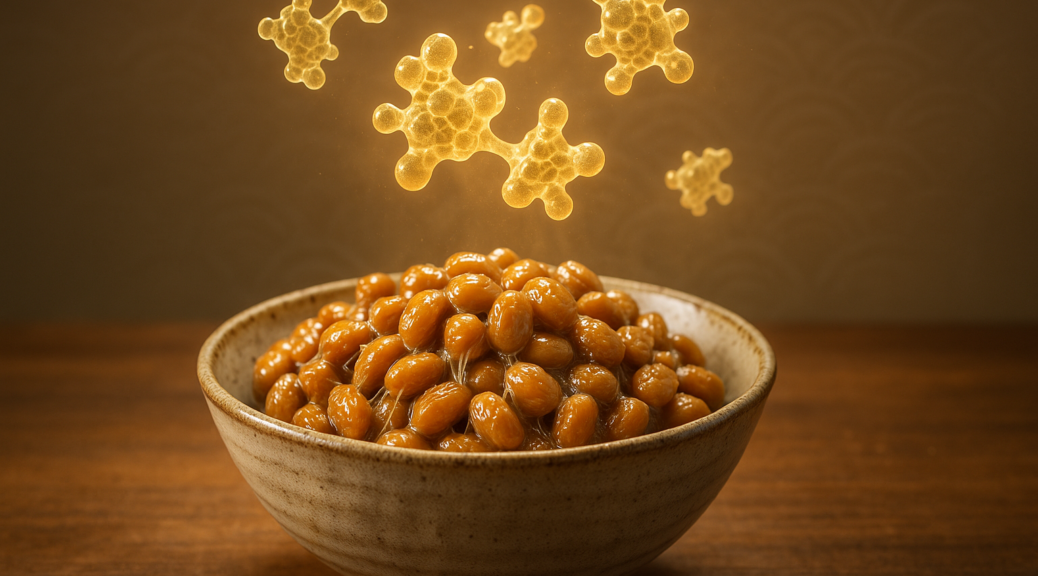
Nattokinase: Benefits, Mechanisms, Risks and My Usage Insight
Discover the benefits, mechanisms, and risks of nattokinase. Learn how to use it effectively with insights from personal experience.
Introduction
In recent years, nattokinase has gained significant attention in the health and wellness community. Derived from natto, a traditional Japanese food made from fermented soybeans, nattokinase is an enzyme linked to numerous health benefits, particularly for cardiovascular health.
Nattokinase’s unique properties have piqued scientific interest. Studies suggest it can dissolve blood clots, lower blood pressure, and reduce inflammation, making it a promising natural remedy for heart health (WebMD).
This blog post explores nattokinase’s mechanisms, benefits, risks, and practical usage tips, including my personal experience.
Understanding Nattokinase
Nattokinase is a powerful enzyme derived from natto, a traditional Japanese food made from fermented soybeans. Natto has been enjoyed in Japan for over a millennium for its unique taste and health benefits. Dr. Hiroyuki Sumi discovered nattokinase in 1980, noting its impressive ability to dissolve fibrin, a key protein in blood clotting.
Nattokinase is renowned for its cardiovascular benefits. It breaks down blood clots, crucial for preventing strokes and heart attacks. This enzyme enhances the body’s natural clot-dissolving processes by activating plasminogen to plasmin, the primary enzyme for clot breakdown.
Additionally, nattokinase lowers blood pressure by inhibiting the angiotensin-converting enzyme (ACE), similar to some blood pressure medications. This dual action of reducing clot formation and lowering blood pressure makes nattokinase a promising natural option for cardiovascular health.
However, caution is necessary. Potential risks include severe allergic reactions, excessive bleeding, and interactions with blood-thinning medications. Always consult a healthcare provider before starting nattokinase supplements.
In summary, nattokinase, from the traditional Japanese food natto, offers significant cardiovascular benefits through its clot-dissolving and blood pressure-lowering properties. Yet, careful monitoring is essential to avoid adverse effects.
Mechanisms of Action: How Nattokinase Works
Let’s delve into the science behind nattokinase and its impact on cardiovascular health. This enzyme, derived from natto, plays a crucial role in dissolving blood clots and managing blood pressure. Understanding these mechanisms can help you make informed decisions about incorporating nattokinase into your health regimen.
Fibrinolytic Activity: Dissolving Blood Clots
Nattokinase stands out for its fibrinolytic activity, crucial for cardiovascular health. It breaks down fibrin, the protein forming blood clots. Here’s how it works:
- Inactivation of PAI: Nattokinase cleaves and inactivates plasminogen activator inhibitor (PAI), enhancing tissue plasminogen activator (tPA) activity, converting plasminogen to plasmin, the main clot-breakdown enzyme.
- Direct Fibrin Degradation: It also directly degrades fibrin, though less pronounced, contributing to its fibrinolytic activity.
- Enhanced Thrombolysis and Anticoagulation: Studies show a single dose significantly increases fibrin/fibrinogen degradation products, indicating enhanced thrombolysis (PMC).
Consult your healthcare provider before starting nattokinase, especially if on anticoagulants.
Anti-Hypertensive Benefits: Managing Blood Pressure
Nattokinase shows promise in managing blood pressure. It inhibits angiotensin-converting enzyme (ACE), reducing blood pressure by relaxing blood vessels. A study in Food Function confirmed significant ACE inhibition in subjects consuming nattokinase.
Additionally, it reduces blood viscosity and improves circulation. A 2008 clinical trial showed participants taking nattokinase had notable reductions in systolic and diastolic blood pressure (Hypertens Res).
Monitor blood pressure regularly when using nattokinase, especially if on antihypertensive medications. Always consult with a healthcare provider before starting any new supplement.
Anti-Inflammatory Properties: Reducing Inflammation
Nattokinase, derived from fermented soybeans, has notable anti-inflammatory properties. Chronic inflammation can lead to cardiovascular and neurodegenerative diseases. Studies show nattokinase mitigates neuroinflammation and apoptosis linked to Alzheimer’s disease (Bhatt et al., 2017).
Additionally, nattokinase enhances preventive effects on colitis in mice (Liang et al., 2022).
To incorporate nattokinase, start with a low dose and monitor your body’s response. Always consult with a healthcare professional before beginning any new supplement, especially if you have underlying health conditions.

Benefits of Nattokinase
Detail the diverse health benefits supported by scientific evidence.
Heart Health: Guarding Against Cardiovascular Diseases
When it comes to heart health, nattokinase has shown promising results in reducing the risk of cardiovascular diseases. I was particularly impressed by a study that highlighted nattokinase’s ability to lower blood pressure and reduce the risk of atherosclerosis. This enzyme works by breaking down fibrin, a protein involved in blood clot formation, which helps prevent clots that can lead to heart attacks and strokes.
Here are some key benefits of nattokinase for heart health:
- Lowers Blood Pressure: Research indicates that nattokinase can reduce both systolic and diastolic blood pressure, making it a natural option for managing hypertension.
- Reduces Cholesterol Levels: Studies have shown that nattokinase can lower total cholesterol, LDL cholesterol, and triglyceride levels, which are crucial for maintaining heart health.
- Prevents Blood Clots: By breaking down fibrin, nattokinase helps to prevent the formation of blood clots, reducing the risk of heart attacks and strokes.
- Improves Circulation: Enhanced blood flow and reduced blood viscosity are additional benefits, contributing to overall cardiovascular health.
Incorporating nattokinase into your daily routine could be a game-changer for your heart health. However, it’s essential to consult with a healthcare provider before starting any new supplement, especially if you are on medication or have existing health conditions. The potential benefits of nattokinase make it a compelling option for those looking to support their cardiovascular system naturally.
Enhanced Circulation: Promoting Blood Flow
One of the most compelling benefits of nattokinase is its ability to enhance circulation and promote blood flow. I started taking nattokinase after reading about its potential to improve cardiovascular health, and I’ve noticed significant improvements in my overall well-being. Here’s how nattokinase works to keep your blood flowing smoothly:
- Inhibits Platelet Aggregation: Nattokinase helps prevent platelets from clumping together, which can reduce the risk of blood clots. This is crucial for maintaining healthy blood flow and preventing conditions like deep vein thrombosis and stroke (Jang et al., 2013).
- Thrombus Formation Reduction: It has been shown to reduce thrombus (blood clot) formation, which is essential for preventing blockages in the arteries and veins. This effect was demonstrated in various studies, including one where nattokinase significantly reduced thrombus formation in rats (Fujita et al., 1995).
- Enhances Fibrinolytic Activity: Nattokinase boosts the body’s ability to break down fibrin, a protein involved in blood clotting. By enhancing fibrinolytic activity, nattokinase helps dissolve existing clots and prevents new ones from forming (Kotb, 2014).
- Improves Blood Viscosity: Regular consumption of nattokinase has been associated with improved blood viscosity, making it easier for blood to flow through the vessels. This can be particularly beneficial for individuals with conditions that affect blood flow, such as diabetes or high cholesterol (Holsworth et al., 2006).
Incorporating nattokinase into your routine could be a game-changer for your circulatory health. Always consult with a healthcare provider before starting any new supplement to ensure it’s safe for you.
Sinus Health: Addressing Chronic Sinusitis
Chronic sinusitis is a persistent inflammation of the sinuses, often caused by allergies, bacteria, fungal infections, or asthma. It’s one of the most common chronic conditions in adults, and managing it can be quite challenging. I’ve personally struggled with sinus issues for years, and finding effective treatments has been a journey. That’s where nattokinase comes into play.
Research indicates that nattokinase can be beneficial for those suffering from chronic sinusitis. This enzyme helps shrink nasal polyps, which are often responsible for blockages. By reducing these polyps, nattokinase improves airflow and alleviates discomfort. Additionally, it thins mucus, making it easier to clear nasal passages.
For those dealing with chronic sinusitis, incorporating nattokinase into your regimen could be a game-changer. Here’s how you can start:
- Consult Your Doctor: Before starting any new supplement, it’s crucial to discuss it with your healthcare provider, especially if you’re on other medications.
- Choose the Right Supplement: Look for high-quality nattokinase supplements. I prefer those that are non-GMO and free from unnecessary additives.
- Dosage: Follow the recommended dosage on the supplement label or as advised by your doctor. Typically, nattokinase is taken once or twice daily.
- Monitor Your Symptoms: Keep track of your sinus health and note any changes. This will help you and your doctor determine if nattokinase is effective for you.
By addressing the root causes of sinus blockages and inflammation, nattokinase offers a natural and potentially effective solution for chronic sinusitis sufferers. It’s been a valuable addition to my health regimen, and I hope it can be for you too.

Risks and Safety Considerations
While nattokinase offers numerous health benefits, it’s crucial to understand the potential risks. This section will cover common and severe side effects, precautions, medication interactions, and who should avoid nattokinase. Always consult your healthcare provider before starting any new supplement.
Safety and Side Effects
Nattokinase is generally safe, but individual reactions can vary. Common side effects include mild digestive issues and headaches. Severe side effects, though rare, can include severe allergic reactions, clot relocation, excessively low blood pressure, and severe bleeding. Pregnant or breastfeeding women, individuals with bleeding disorders, and those with severe soy allergies should exercise caution or avoid nattokinase altogether. Always consult a healthcare provider before starting nattokinase supplements.
Medication Interactions
Nattokinase can interact with various medications, particularly blood thinners like warfarin and heparin, increasing the risk of bleeding. It can also amplify the effects of blood pressure medications, potentially leading to excessively low blood pressure. Combining nattokinase with aspirin can cause severe bleeding. Always consult your healthcare provider before starting nattokinase if you’re on any medication to manage these interactions effectively.
Who Should Avoid Nattokinase?
Certain groups should avoid nattokinase. Pregnant and breastfeeding women, children, individuals with blood disorders, and those on blood thinners should steer clear due to potential risks. People with low blood pressure or severe allergies to soy or nattokinase components should also avoid it. Always consult with a healthcare provider before starting any new supplement to ensure it’s safe for you.

Using Nattokinase: Practical Advice
Learn how to integrate nattokinase into your daily regimen safely and effectively.
Forms of Supplements
When it comes to incorporating nattokinase into your health regimen, you have several supplement forms to choose from. Personally, I find the variety quite convenient, as it allows me to select the form that best fits my lifestyle and preferences. Here are the main options available:
- Capsules and Tablets: These are the most common forms of nattokinase supplements. They are easy to dose and convenient to take, especially if you’re already accustomed to taking daily vitamins. I usually opt for capsules because they are easy to swallow and fit seamlessly into my morning routine.
- Powder: If you have difficulty swallowing pills, nattokinase powder might be a better option. You can mix it into smoothies, juices, or even water. This form is particularly useful if you prefer to incorporate supplements into your meals. I sometimes add it to my post-workout shakes for an extra health boost.
- Vegan and Vegetarian Options: For those following a plant-based diet, there are vegan and vegetarian nattokinase supplements available. These options ensure that you can still reap the benefits of nattokinase without compromising your dietary choices. I appreciate having this option as it aligns with my commitment to a plant-based lifestyle.
When choosing a nattokinase supplement, it’s crucial to consider what you hope to achieve and follow the recommendations of your healthcare provider. Each form may work slightly differently, so it’s important to select the one that best suits your needs and preferences. Always check the label for dosage instructions and consult with a healthcare professional to ensure you’re taking the supplement safely and effectively.
Dosage Guidelines
When it comes to taking nattokinase, getting the dosage right is crucial for maximizing its benefits while minimizing potential risks. Based on various studies and expert opinions, here are some guidelines to help you navigate the optimal dosage for nattokinase supplements:
- General Dosage Range: Most studies suggest that the health benefits of nattokinase come with an oral dose of 100 to 200 milligrams per day (WebMD). This range is considered effective for promoting cardiovascular health and improving blood circulation.
- Fibrinolytic Units: Nattokinase is often measured in fibrinolytic units (FU). The typical dosage ranges from 2,000 to 7,000 FU per day (WebMD). This measurement helps standardize the enzyme’s activity, ensuring consistency across different supplement brands.
- Duration of Use: For those new to nattokinase, starting with a lower dose and gradually increasing it can help your body adjust. Clinical trials have shown that taking nattokinase daily for up to three years is generally safe (Verywell Health). However, it’s always best to consult with a healthcare provider for personalized advice.
- Special Considerations: If you’re pregnant, breastfeeding, or on blood-thinning medications, consult your doctor before starting nattokinase. The enzyme’s potent fibrinolytic activity can interact with other medications and conditions, potentially leading to complications (Memorial Sloan Kettering Cancer Center).
By following these dosage guidelines, you can safely incorporate nattokinase into your health regimen, reaping its benefits while minimizing risks. Always remember to consult with a healthcare provider to tailor the dosage to your specific needs and health conditions.
My Personal Experience with Nattokinase
When I first heard about nattokinase, I was intrigued by its potential benefits for heart health and blood circulation. As someone who values natural supplements, I decided to give it a try. I started with a daily dose of 100 mg, which is within the recommended range for general health maintenance.
Within a few weeks, I noticed a subtle yet significant improvement in my overall energy levels and circulation. My hands and feet, which often felt cold, were warmer, indicating better blood flow. Additionally, I experienced fewer headaches, which I attribute to the improved circulation and reduced blood pressure.
One of the most notable changes was in my sinus health. I have a history of chronic sinusitis, and after incorporating nattokinase into my routine, I found that my sinus congestion was less frequent and less severe. This was a pleasant surprise, as I had not initially considered this benefit.
However, it’s important to note that I did experience some mild side effects initially, such as slight stomach discomfort. This subsided after a few days as my body adjusted. I also made sure to consult with my healthcare provider before starting nattokinase, especially since I was already taking other supplements like magnesium and turmeric for their respective benefits.
Overall, my experience with nattokinase has been positive. It has become a staple in my supplement regimen, alongside other natural products like ashwagandha and apple cider vinegar. I recommend anyone considering nattokinase to start with a lower dose and consult with a healthcare professional to ensure it’s appropriate for their individual health needs.

Conclusion
Nattokinase offers significant potential as a natural supplement for cardiovascular health. Its ability to dissolve blood clots and lower blood pressure is backed by studies from sources like PMC. However, its use requires caution, especially for those on blood thinners or with bleeding disorders. My personal experience has been positive, with noticeable improvements in circulation and sinus health. Always consult a healthcare provider before starting nattokinase to ensure it’s suitable for your specific health needs.
References:
[1] https://www.verywellhealth.com/what-is-nattokinase-89831
[2] https://www.webmd.com/diet/health-benefits-nattokinase
[3] https://www.mskcc.org/cancer-care/integrative-medicine/herbs/nattokinase
[4] https://www.ncbi.nlm.nih.gov/pmc/articles/PMC6043915/